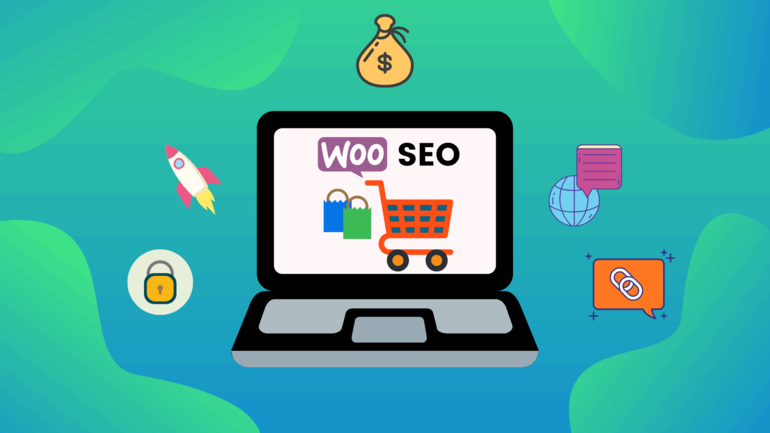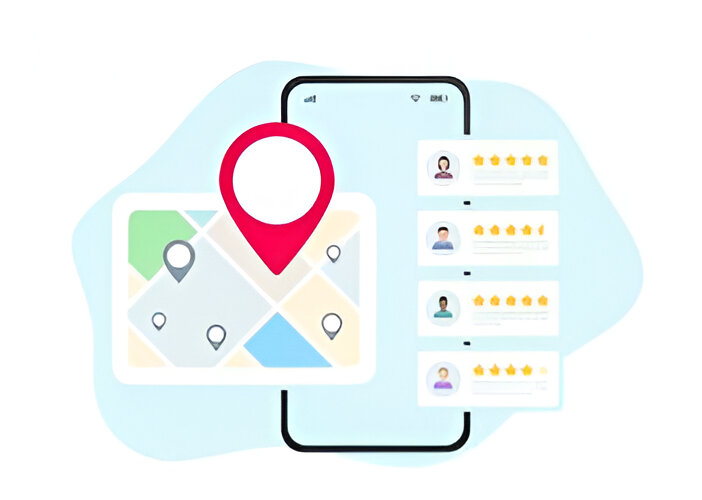WooCommerce SEO Services
Boost Your Online Presence with Our WooCommerce SEO Services
WooCommerce SEO Services: Rank Higher and Sell More
You’ve put together an incredible WooCommerce store, and filled with incredible products, and you’re excited to begin selling. However, no one is purchasing. What’s going on? The reality is that If customers cannot locate your shop and aren’t able to buy from you. If you’re an online business owner your success will depend on the search engine optimization, or SEO.
SEO in WooCommerce is vital in helping people find your shop via Google or other popular search engines. If your website is found to be more prominent on search engine results, it will receive more customers and sales. The good thing is that you do not have to manage WooCommerce SEO by yourself. SEO experts can assist you in optimizing your store’s visibility and increase your profits. Continue reading to discover the best WooCommerce SEO options to help bring your store visible to more customers and to sell more products. Your success as a business is only two clicks and a well-optimized store.

What Is WooCommerce SEO and Why It Matters
If you own online stores powered by WooCommerce it is essential to concentrate in WooCommerce SEO to improve sales and traffic. SEO for WooCommerce or SEO for search engines, assists search engines such as Google discover and rank your items and blog posts in the results.
What is WooCommerce SEO mean? The first thing you must do is create keyword-optimized title pages and meta descriptions. These are the small snippets of text searchers will see in search results that convince users to take action. Include your desired keywords particularly in the initial few words.
Next, you should focus on the content. Create blog posts and descriptions of products that naturally include keywords relevant to your product and the industry. Links to internal content, and encourage other websites to link to you. The higher good content and backlinks that you’ve got, the better you’ll be ranked.
Do not forget to consider speed of pages and mobile-friendliness. In 2021, Google favors fast, mobile-friendly websites. Make use of caching plugins to increase the speed of loading pages and make sure that your site looks stunning on every device.
Also, you should make sure you submit your XML websitemap for Google Search Console so they are able to crawl your site efficiently. Include individual product pages to increase your chances of being ranked.
WooCommerce SEO isn’t without work, but the benefits of more traffic and greater sales are worth the effort. Through optimizing pages’ titles and contents as well as speed and mobile-friendlyness creating backlinks, and uploading sitemaps the WooCommerce store will be able to reach more customers and improve the bottom line of your business. If you follow the right plan and tools you’ll be on your path to the very top of the search results within a matter of minutes.

Get your free audit

Technical WooCommerce SEO - Optimizing Site Speed and Structure
To rank higher in search engines and increase traffic and sales, technical WooCommerce SEO is crucial. This includes optimizing your site speed and structure.
Site Speed
A fast loading site is essential. Slow sites frustrate visitors and hurt your ranking. Enable caching to speed up your store. A caching plugin stores temporary site data, so pages load faster for visitors. You should also compress images and enable gzip compression to shrink file sizes.
Minimize redirects and fix any 404 errors. Redirects slow down your site by sending visitors to different URLs. And 404 errors mean links are broken, damaging user experience. An SEO audit can uncover these issues so you can resolve them.
Optimizing Site Structure
Your WooCommerce site structure directly impacts ranking. Make sure each product has a unique URL with the product name or SKU. This helps search engines understand each page.
Use an SEO-friendly theme and page names. Choose a theme optimized for search engines. And give pages descriptive names like ‘mountain-bikes’ rather than ‘product-category-3’.
Keep your site mobile-friendly. More and more people shop on their phones, so a responsive design is key. Make sure content displays well on mobile devices.
Use alt text for images. Add alternate text to describe your product images. This helps search engines understand what the images contain and ranks them higher in image search.
Technical SEO sets the foundation for good ranking and sales. By optimizing site speed and structure, you’ll provide a great user experience, please search engines, and attract more organic traffic and customers to your WooCommerce store. With some time and effort, you’ll start climbing higher in the search results.

Content Optimization - Product Pages, Categories, Blog
Content is king, and for an ecommerce store, product pages are your kingdom. To rank higher in search engines and sell more, you need compelling product content. Here are some tips to optimize your WooCommerce product pages:
Focus on Product Titles
Your product titles are the first thing people see in search results, so make them count. Include your target keyword, the product name, and its key features or benefits. For example, “SuperSoft Bamboo Fitness Tracker – Activity & Sleep Monitor with Heart Rate Sensor”.
Optimize Categories and Tags
Well-optimized categories and product tags improve navigation and searchability. Choose keywords that match your target audience’s search terms. For example, a shirt could have categories like “clothing,” “tops,” “casual shirts,” and tags like “cotton,” “crew neck,” “short sleeve.”
Write Product Descriptions That Sell
Describe your product in detail highlighting its best features and benefits. Mention the materials used, dimensions, and specifications. Most importantly, focus on how it can improve your customer’s life. Describe the experience of using the product to help the customer visualize it. Use images to complement the descriptions.
Write a Product FAQ
A Frequently Asked Questions section addresses common customer questions and concerns. It builds trust and helps customers make purchase decisions. Answer questions about shipping, returns, sizes, installation, and product specifications.
Include High-Quality Images
High-resolution product images are essential for any ecommerce store. Include multiple images showing the product from different angles. Having a zoom-in feature allows customers to see details. For clothing and accessories, include images of people wearing the product.
Publish Product Reviews and Testimonials
Product reviews and testimonials from real customers build social proof and credibility. Encourage happy customers to leave reviews on your product pages and share their experience. Positive reviews and high ratings lead to higher conversion rates and sales.
Optimizing your product content is key to achieving higher organic rankings in search engines like Google. With compelling titles, descriptions, images, and reviews, your products will get more visibility and attract more customers. Our WooCommerce SEO experts can help take your product page optimization to the next level.

Keyword Research and Targeting for WooCommerce Sites
Keyword research is essential for any WooCommerce store. By optimizing your site for the right keywords, you can drive more organic traffic and increase sales. The keywords you target should be:
Relevant to your products and brand
Focus on keywords that match what you actually sell. If you sell handmade jewelry, target phrases like “artisan jewelry” or “handcrafted gemstone necklaces.” Forget vague terms like “ecommerce” or “shopping.”
Popular but not too competitive
Aim for keywords that get a good amount of searches each month, so you have an opportunity to rank for them. But avoid terms that huge brands already dominate the top spots for. Use a tool like Google’s Keyword Planner to check monthly search volume and difficulty.
Long-tail keywords
Don’t just target single words or short phrases. Long-tail keywords, like “personalized silver necklaces for bridesmaids,” are more specific, so easier to rank for. And people searching for them are often closer to a buying decision.
In page titles, URLs, image alt text and content
Place your target keywords in strategic locations to signal to Google what your page is about. Have your primary keyword in your page title, URL, first heading, and scattered in the content—but don’t overdo it. Use synonyms and related terms too, for a natural feel.
Continually optimize
Keyword targeting is an ongoing process. Check your Google Analytics to see which keywords are driving the most traffic and conversions. See if there are any new related keywords you can target. Update old content and add new content focused on the most valuable keywords.
By defining a smart WooCommerce SEO keyword strategy, you can connect with more customers looking for the products you offer. Be patient, as it can take time to start ranking higher and seeing results. But with continuous optimization of your keywords and content, you’ll soon enjoy an influx of organic traffic and sales. Focus on providing the best experience for your potential customers at every step of their journey.

Local SEO for WooCommerce - Improving Local Visibility
Local SEO optimizes your WooCommerce store to rank higher in local search results and increase visibility to nearby customers. By improving your local SEO, you can drive more foot traffic and sales from people in your area.
Optimize Your Business Listings
Claim and optimize your business listings on sites like Google My Business, Bing Places for Business, and Yelp. Add your business name, address, phone number, website, and business hours. Also include photos and encourage customer reviews. These listings influence your local search rankings, so keep them up to date.
Focus on Local Keywords
Incorporate location-specific keywords into your page titles, URLs, headings, and content. For example, use “SEO Agency in Springfield” instead of just “SEO Agency“. Mention your city and state name, area code, zip code, and neighborhood throughout your site.
Build Location-Based Content
Create content that focuses on your local area, customers, and community. Write blog posts highlighting local attractions, events, news, and partners. Start a video series interviewing neighborhood business owners or residents. Sponsor a local charity or organization and promote it on your site. This location-based content strengthens your ties to the community and improves local SEO.
Get Reviews from Local Customers
Customer reviews mentioning your business location or city carry more weight for local SEO. Encourage happy local customers to leave reviews on your website and third-party sites like Google, Facebook, and Yelp. Respond to all reviews to show you value customer feedback. The more positive local reviews you have, the higher you’ll rank in local results.
Promote Your Location on Social Media
Engage local followers on social media by posting about community events, landmarks, news, jobs, and partnerships. Use location tags, geotags, and hashtags to associate your social content with your city or neighborhood. Run social media contests and promotions targeting local customers. An active local social media presence translates into improved local search visibility.
Optimizing for local SEO requires ongoing effort but the rewards of increased foot traffic and sales from your community can be well worth it. Focus on these key areas and your WooCommerce store will start ranking higher in local search results in no time.

Link Building Strategies for WooCommerce SEO
Link building is one of the most effective ways to improve your WooCommerce store’s SEO and increase organic traffic. By acquiring high-quality backlinks from authoritative sites in your industry, you’ll boost your domain authority and search engine rankings.
Guest Blogging
Reaching out to industry influencers and asking if you can contribute a blog post to their site is a great way to earn a backlink. Write a useful, insightful post and include a natural link back to your WooCommerce store within the content. Make sure any links you include are contextual, providing value to the reader. Guest blogging is a win-win – you get a backlink, and the site owner gets a high-quality content asset.
Broken Link Building
Search for broken links on industry-relevant sites and reach out to the webmaster offering to provide an alternative resource to link to – your WooCommerce store! Let them know you noticed a 404 error on their site and suggest a suitable page on your store as a replacement link. Broken link building is a clever way to acquire high-quality backlinks from authority sites.
Resource Linking
Create resources like blog posts, guides, or tools and reach out to sites to ask if they would link to your resource. For example, you could create an in-depth guide on “The 10 Best WooCommerce Plugins” and contact sites to suggest they link to your guide as a resource for their readers. Resource linking is an opportunity to provide value to others while earning a relevant backlink.
Social Bookmarking
Social bookmarking involves saving and tagging useful web resources. Sites like Digg, Reddit, and StumbleUpon allow users to submit and vote on links. Submit a link to a valuable page on your WooCommerce store on these platforms to start earning backlinks as people bookmark and upvote your content. The more votes and shares you get, the higher your link will rank.
Link building does require effort and persistence, but the rewards of higher search rankings, increased organic traffic, and more sales can be well worth it. Focus on a diverse range of high-quality link building strategies, and your WooCommerce SEO will thrive.

Get your free audit

WooCommerce SEO Plugins and Tools to Consider
To boost your WooCommerce store’s visibility, several useful SEO plugins and tools can help. These handy resources automate and optimize key on-page and off-page SEO factors to rank higher in search engines like Google.
Yoast SEO
The most popular WordPress SEO plugin, Yoast SEO tightens up your on-page SEO. It lets you easily optimize page titles and meta descriptions, internal linking, and more. Yoast SEO also gives you feedback and suggestions to improve your content. For WooCommerce stores, it integrates seamlessly and adds eCommerce-specific features like optimizing product titles, descriptions and breadcrumbs.
Google Search Console
This free tool from Google provides insights into how your WooCommerce store is performing in Google search results. You’ll see information like which pages are indexed, receiving traffic and need improvement. Google Search Console alerts you to any issues preventing pages from being indexed so you can fix them. It’s a must-have for any WooCommerce SEO strategy.
SEMrush
For researching your competitors and evaluating your off-page SEO, SEMrush is an invaluable paid tool. It lets you see which keywords your competitors rank for, where they’re getting backlinks, how their organic traffic is trending and more. Use these insights to determine opportunities to surpass them in rankings. SEMrush also provides keyword research tools to find the best terms to target for your WooCommerce store.
Backlink Watch
To build high-quality backlinks, you need to monitor your existing backlinks and check for any that are broken or low-quality. The Backlink Watch plugin automatically monitors your site’s backlinks and alerts you to any issues. It helps keep your off-page SEO in good shape, which positively impacts your search rankings and referral traffic.
Focusing on both on-page and off-page optimization with the help of useful plugins and tools can significantly improve your WooCommerce store’s SEO and search rankings over time. Tightening up technical SEO, optimizing content, building high-quality backlinks and keeping an eye on competitors and search performance will all contribute to better visibility and more organic traffic and sales.
Analyzing and Tracking Your WooCommerce SEO Results
Once your WooCommerce store is set up and optimized, it’s time to analyze how your SEO efforts are paying off. Tracking your key metrics and rankings will show you what’s working, what needs improvement, and where to focus your efforts going forward.
Search Engine Rankings
The most obvious way to gage your SEO success is to check where your site ranks in Google and other search engines for your target keywords. Are you on the first page for your most important keywords? Climbing the ranks over time? Falling in position? Use a tool like SEMrush, Ahrefs or Moz to track your rankings and see how you compare to competitors.
Organic Traffic
If your rankings are improving, you should see steady growth in organic search traffic to your site. Organic traffic refers to visitors who find you through unpaid search engine results. Check your Google Analytics account to view trends in organic traffic over weeks, months and years. More traffic means your SEO and content strategies are resonating with searchers.
Conversions
Ultimately, the goal of SEO for an ecommerce store is to drive more sales. So monitor how many of your organic visitors actually make a purchase. Look for a healthy conversion rate of at least 2-3% for organic traffic. If that number is low, it may indicate issues with your content, product pages or checkout process that need to be addressed.
Keyword Ranking Difficulty
Pay attention to how competitive it is to rank for your target keywords. The more difficult they are, the more work you’ll need to put in. Use a keyword research tool to determine the search volume and difficulty of ranking for key terms. Then double down on optimizing for high-volume, moderately difficult keywords.
Keyword Ranking Difficulty
Pay attention to how competitive it is to rank for your target keywords. The more difficult they are, the more work you’ll need to put in. Use a keyword research tool to determine the search volume and difficulty of ranking for key terms. Then double down on optimizing for high-volume, moderately difficult keywords.
Backlinks
The number and quality of backlinks pointing to your site is a key ranking factor. Check your backlink profile regularly to make sure you’re building new high-quality links over time. Losing a large number of links quickly could negatively impact your rankings. Most SEO tools offer a way to monitor your backlinks and even disavow low-quality links.
Keeping a close eye on these key SEO metrics will help ensure your WooCommerce store continues climbing the ranks and bringing in more organic traffic and sales. Make tracking and analysis a regular part of your optimization efforts.
FAQ on WooCommerce SEO Services and Best Practices
Once your WooCommerce store is up and running, it’s time to focus on search engine optimization (SEO) to increase visibility and drive more traffic and sales. Here are some frequently asked questions about WooCommerce SEO services and best practices:
Optimizing your WooCommerce store for SEO has many advantages:
- Higher rankings in search engines like Google, Bing and Yahoo. This means more organic traffic from people searching for your products or services.
- Improved on-page optimization. SEO experts will optimize your store’s pages by adding relevant page titles, meta descriptions, headers, content, internal linking and more.
- Backlink building. SEO pros can build high-quality backlinks from authoritative sites to help boost your search rankings.
- Increased conversions and revenue. With an optimized store, you’ll get more targeted traffic which leads to higher conversion rates and more sales.
WooCommerce SEO services focus on optimizing:
- Home page
- Product pages
- Category pages
- Blog posts
- Page titles and meta descriptions
- Page content including headers, images and videos
- Internal site structure and navigation
- Schema markup for products, FAQs, business info, etc.
- Loading speed and mobile-friendliness
WooCommerce SEO service pricing depends on the scope of work and the SEO company, but you can typically expect to pay:
- $500-$3,000+ per month for ongoing SEO management
- $5,000-$30,000+ for an initial SEO website audit and optimization
The investment is well worth it though for the long-term benefits to your business. Professional SEO for WooCommerce stores is the key to unlocking your store’s true potential.
Conclusion
You now have the information you need to take your WooCommerce store to the next level. With professional SEO services tailored to your needs, you’ll gain more traffic, higher rankings, and increased sales. The key is finding a team you trust, with proven strategies and expertise optimizing WooCommerce stores. Don’t wait – your competitors are optimizing their stores right now. Get started today by reaching out to a reputable agency, and watch as your store gains more visibility and your sales start climbing. The investment you make in WooCommerce SEO will pay off hugely in the long run. What are you waiting for? Take action and reap the rewards.



